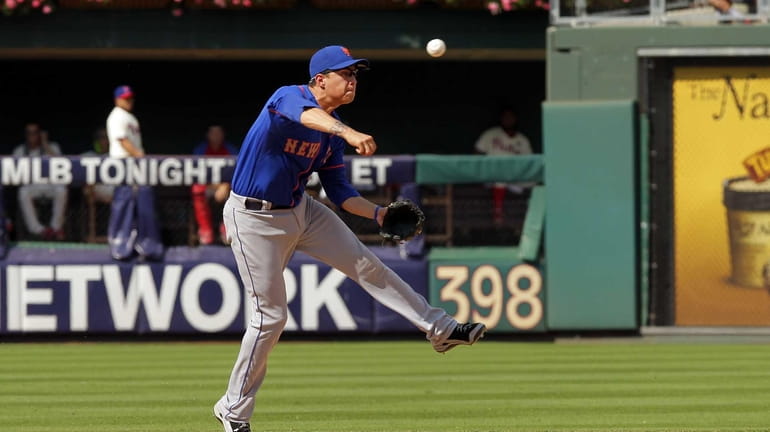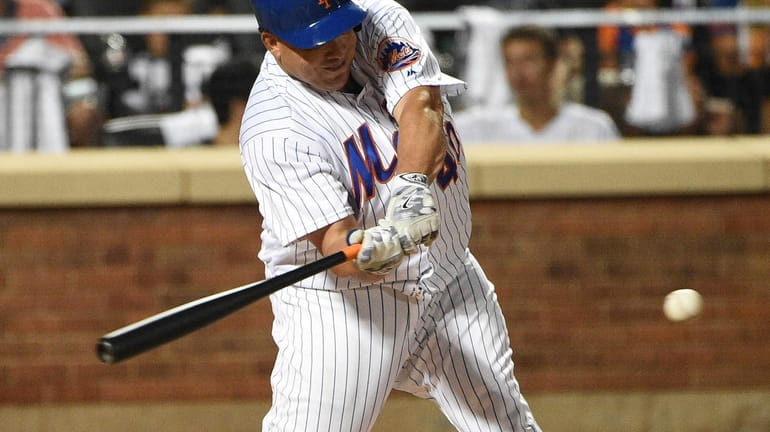Wilmer Flores the long-term answer at shortstop for Mets?

Wilmer Flores throws to first base after fielding a ground ball during a game against the Philadelphia Phillies at Citizens Bank Park on August 10, 2014. Credit: Getty Images
Earlier this month, as he assessed the team's long-term plan at shortstop, Mets general manager Sandy Alderson called Wilmer Flores a "viable option." Since then, Alderson has made comments that have only bolstered that belief.
However, voices within the organization also have expressed some concern about sticking with Flores, particularly if it means passing up a chance to upgrade during the offseason.
That hesitation stems from Flores' production on offense -- marking a bit of a shift, given that initial concerns initially were centered on his defense.
Mets manager Terry Collins acknowledged this week that though he's been pleased with what he has seen in the field, Flores is "never going to be that quick, rangy guy" at shortstop. It's a sacrifice the Mets have been willing to make, assuming that Flores would provide some thump in the lineup.
Problem is, Flores has yet to show that production with any regularity. Now, with the offseason looming, the Mets must decide whether his bat is worth the wait.
It's a gamble that is made more complicated because Flores will be out of options, meaning that the Mets no longer will have the freedom to simply demote him if he struggles. Flores, 23, first would have to pass through waivers, where he almost certainly would be claimed by another team.
Flores has heated up in the homestretch, perhaps an indication that he has gotten more comfortable in the big leagues. "When you're feeling good, you trust your hands, so you try to see it first and then go," he said. "Sometimes when you don't trust your hands, you just go forward and swing at bad pitches. But if you trust your hands, you're going to see if it's a strike or a ball before you swing."
Flores is hitting .308 in his last 17 games, but the most encouraging development has been an uptick in his power. He's slugging .600 during that span, the product of five doubles, a triple and four homers. He also has collected 13 RBIs, a total befitting an impact producer.
"He's shown there's no reason why, if he continues to swing the bat the way he is, that he can't be a middle-of-the-lineup everyday shortstop," Collins said. "There's no reason why not."
Of course, there's little reason to make too much of his recent surge. As Collins himself has mentioned numerous times, late-season results often can give distorted views of production. When Flores' body of work is taken into account, the picture gets far less flattering. In 224 at-bats, he has a slash line of only .246/.280/.384. Among National League shortstops -- who have posted an average of .254/.314/.377 this season -- Flores' output remains below average in every department except for slugging.
Flores' fate moving forward hinges mostly on whether the Mets believe he is capable of sustaining his recent production, especially given that they've been content with what he's done in the field.
Though he's committed four errors at short, Flores said he has been "very satisfied" with his defense, mostly because he has generally made the routine plays.
Though his range remains below average, he has covered more ground than expected by some team officials and rival scouts. He believes that extra mobility was a product of the conditioning camp in Michigan he attended last winter.
"The offseason paid off. All the work in November last year and this January, it helped," said Flores, whose footwork also has improved.
But offensively, the Mets must hope that Flores' recent upswing signals something beyond just a hot streak. They need more growth, and a more compelling reason to believe that the tradeoff for his bat eventually will be worthwhile.
"The thing is, I'm seeing the ball," he said. "I'm recognizing pitches, that's the main thing."

